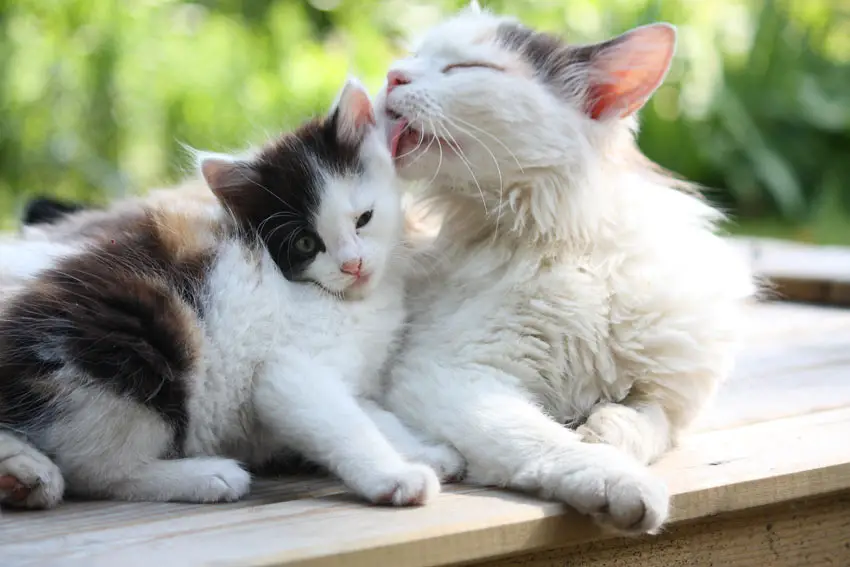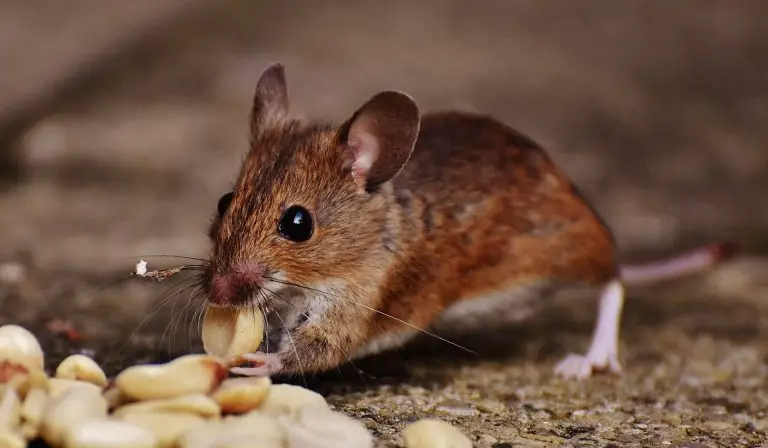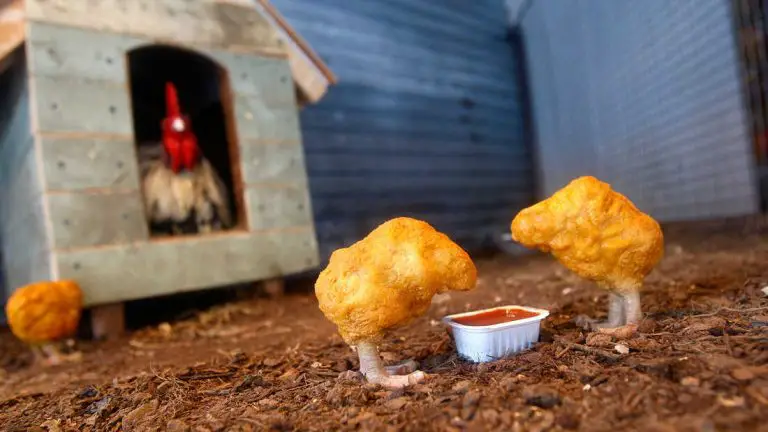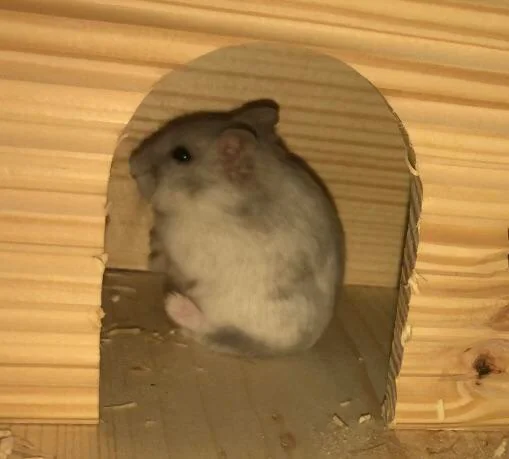Why Is My Cat Biting Her Kittens?
A cat may bite her kittens due to maternal aggression or stress-related factors, such as discomfort or anxiety. This behavior is often a protective instinct or a way to discipline the kittens.
However, it is important to determine the underlying cause and address it to ensure the safety and well-being of the kittens. Understanding why this behavior occurs and implementing appropriate interventions can help create a safe and harmonious environment for the entire feline family.
By observing the cat’s behavior, seeking veterinary advice, and providing a supportive and stress-free environment, you can help mitigate the issue of maternal aggression and promote a positive relationship between the mother cat and her kittens.
Understanding Maternal Instincts
Cats biting their kittens can be a natural behavior stemming from maternal instincts. As newly born kittens are fragile and helpless, their mothers instinctively engage in various behaviors to care for them. Biting can be a form of discipline for the mother cat, teaching her kittens boundaries and appropriate behavior. However, it’s important to note that the bites are usually gentle and not harmful.
Another reason for the biting behavior could be the mother’s efforts to relocate her kittens. By carrying them in her mouth, she ensures their safety and moves them to a new hiding spot. Moreover, biting can serve as a protection mechanism. The mother cat may bite her kittens to shield them from perceived threats, such as unfamiliar scents or sounds, which she wants to keep at a distance.
Health And Stress Factors
Health issues can play a significant role in a cat’s tendency to bite her kittens. Certain health conditions, such as infections or injuries, can cause discomfort or pain, leading the mother cat to react aggressively towards her offspring. It is important to ensure that the mother cat receives regular veterinary care to address any underlying health problems.
Stress can also contribute to a cat’s biting behavior towards her kittens. Feline mothers may exhibit stress responses, such as aggression, when they feel threatened or overwhelmed. Environmental stressors, such as loud noises or disruptions in their living environment, can trigger these behaviors. Providing a calm and secure environment for the mother cat and her kittens can help alleviate stress and reduce the likelihood of biting incidents.
The weaning process can also impact a mother cat’s behavior towards her kittens. As the kittens begin to transition from nursing to solid food, the mother may become more impatient and less tolerant. This can sometimes result in biting or aggressive behavior. Gradually introducing the kittens to solid food and ensuring they have appropriate nourishment can help minimize any potential negative behaviors from the mother.
Interpreting Feline Communication
If you notice your cat biting her kittens, it’s important to understand that this behavior is a form of communication. Biting is a way for a mother cat to assert her dominance and teach her kittens boundaries and social cues. While it may seem aggressive, it’s important to differentiate between gentle and aggressive biting. Gentle biting is often a sign of affection or overstimulation, and the mother cat is simply trying to redirect the kittens’ behavior. However, aggressive biting can be a sign of aggression or stress. It’s crucial to closely observe your cat’s body language and the context in which the biting occurs. If you notice any signs of distress or injury, it’s best to consult with a veterinarian or a feline behaviorist for guidance.
Understanding feline communication is key in interpreting your cat’s behavior and ensuring the well-being of both the mother cat and her kittens. By observing their interactions and providing proper guidance, you can help create a safe and harmonious environment for the entire feline family.
Addressing Behavioral Concerns
When a mother cat starts biting her kittens, it can be concerning for pet owners. However, it’s important to understand that this behavior is relatively normal in feline mothers. Consulting with a veterinarian is crucial in such situations to rule out any underlying health conditions that might be causing this behavior. Once medical issues are ruled out, behavioral modification techniques can be useful in managing the biting behavior.
Creating a safe and comfortable environment is essential for the well-being of the mother cat and her kittens. Providing a safe space where the mother can retreat and relax away from her kittens can help reduce stress. Additionally, ensuring that the kittens have their own designated space where they can nurse and play can prevent confrontations that may lead to biting.
By implementing these strategies and seeking professional guidance, pet owners can address and manage the biting behavior in a safe and compassionate manner, ensuring the health and happiness of both the mother cat and her kittens.
Creating A Supportive Environment
Provide a safe and comfortable environment for your cat and her kittens. Set up a separate area, like a quiet room, where they can have privacy and feel secure. Place a cozy bed or a nesting box with soft blankets for the mother cat and her kittens to sleep in. Ensure that the temperature is warm and the area is free from drafts.
Provide a variety of toys and objects for the kittens to explore and play with. This will help to keep them occupied and redirect their biting behavior. Offer interactive toys such as feather wands, small balls, or puzzle toys that dispense treats. Rotate the toys regularly to keep them engaging and prevent boredom.
Engage in structured play sessions with the mother cat to help her bond with her kittens and teach appropriate behavior. Use interactive toys and mimic prey-like movements to engage her hunting instincts. This can also help redirect her biting behavior towards appropriate play objects instead of her kittens.
Keep a close eye on the interactions between the mother cat and her kittens. If you notice any aggressive behavior or excessive biting, intervene to prevent harm to the kittens. Redirect the mother cat’s attention towards appropriate play or provide her with alternative outlets for her energy, such as regular exercise sessions.
| Enhancing the living space for comfort | Toys and distractions for kittens | Structured playtime with the mother cat | Monitoring interactions between cats |
|---|---|---|---|
| Provide a safe and comfortable environment for your cat | Provide a variety of toys and objects for the kittens | Engage in structured play sessions with the mother cat | Keep a close eye on the interactions between the mother cat and her kittens |
| Set up a separate area, like a quiet room, where they can have privacy | Offer interactive toys such as feather wands, small balls, or puzzle toys | Use interactive toys and mimic prey-like movements | If you notice any aggressive behavior or excessive biting, intervene |
| Place a cozy bed or a nesting box with soft blankets | Rotate the toys regularly to keep them engaging | Help her bond with her kittens and teach appropriate behavior | Redirect the mother cat’s attention towards appropriate play |
| Ensure that the temperature is warm and the area is free from drafts | Prevent boredom and redirect their biting behavior | Redirect her biting behavior towards appropriate play objects | Provide her with alternative outlets for her energy |

Frequently Asked Questions Of Why Is My Cat Biting Her Kittens?
Why Is My Cat Being Aggressive To Her Kittens?
Cats may become aggressive towards their kittens due to stress, fear of intrusion, illness, or lack of maternal instincts.
Why Do Cats Bite Kittens?
Cats may bite kittens to establish dominance, teach boundaries, or correct behavior. In some cases, it could be a result of stress or fear. Providing separate spaces, monitoring interactions, and gradual introductions can help prevent such behavior.
Can A Mother Cat Hurt Her Kittens By Carrying Them?
A mother cat generally doesn’t hurt her kittens while carrying them. However, she may accidentally scratch them if they wiggle too much. It’s important to provide a safe and comfortable environment for the mother cat and her kittens to prevent any potential accidents or injuries.
Will A Mother Cat Take Back A Kitten?
Yes, a mother cat may take back a kitten if she senses danger or if the kitten was separated unintentionally.
Conclusion
To sum up, understanding why a cat bites her kittens is crucial for their well-being. By recognizing the underlying causes such as stress, fear, or maternal instincts, pet owners can intervene and provide a safe environment for both the mother cat and her kittens.
Seeking professional advice and implementing behavioral modifications can effectively address this issue, preventing potential harm and ensuring a harmonious relationship within the feline family.







